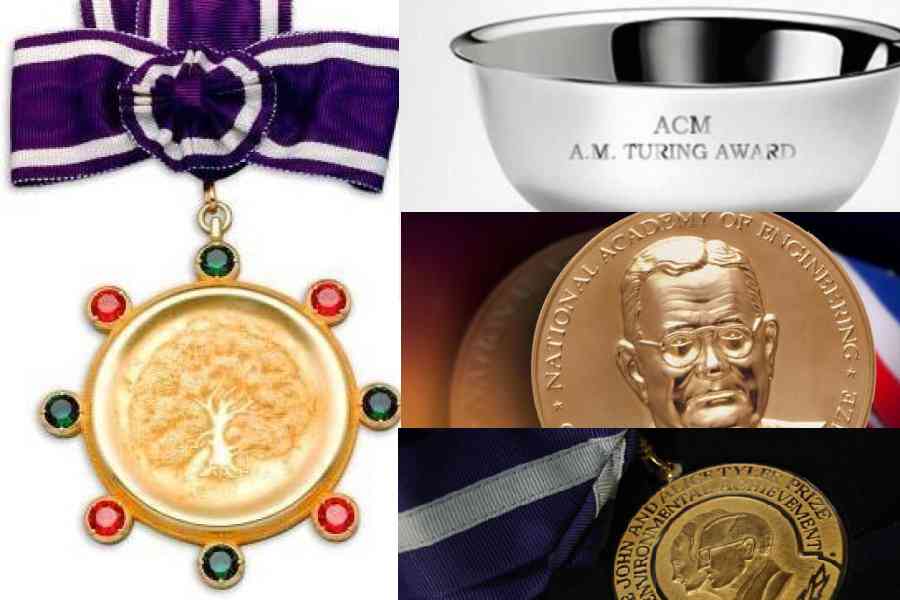Every October, scientists eagerly await the announcement of the Nobel Prizes in physics, chemistry and medicine. But many researchers outside of those fields may miss out on opportunities for the international acclaim that comes with being named a laureate of the Nobel, the most prestigious award in science.
Many have argued for an expansion of the Nobel categories, especially because science has grown increasingly interdisciplinary since the prizes were established in 1900. But that has yet to occur.
Below are eight prizes that scientists and mathematicians who may never earn a Nobel can look forward to.
Abel Prize
Established in 2002, the Abel Prize awards 7.5 million Norwegian kroner, or about $7,00,000, annually to a mathematician with “pioneering scientific achievements” in the field. It is named after Norwegian mathematician Niels Henrik Abel.
In March, the Norwegian Academy of Sciences and Letters named this year’s Abel laureate as Michel Talagrand of the National Centre for Scientific Research in France for his work on understanding randomness in nature.
Only one woman has won the Abel Prize: Karen Uhlenbeck, a University of Texas, US, mathematician, in 2019 for her work on geometric analysis.
Millennium Technology Prize
Every other year, Technology Academy Finland announces the winner of the Millennium Technology Prize for innovations that support a more sustainable, enhanced quality of life. First awarded in 2004, the prize gives €1 million ($1.1 million) to recognise inventions ranging from low-cost solar cells to next-generation DNA sequencing.
Bantval Jayant Baliga, an engineer at North Carolina State University, US, received the prize in 2024 for inventing the insulated-gate bipolar transistor, a semiconductor device that is used widely in wind and solar power installations, home appliances and electric cars. It has made renewable energy usage more efficient and profitable, the academy said.
Turing Award
The Association for Computing Machinery founded this $1 million award in honour of Alan Turing, a British mathematician considered by some to be the father of modern computer science. The award has been granted annually since 1966 for contributions to computing, including cryptography and artificial intelligence. It has been sponsored by Google since 2014.
Avi Wigderson, a computer scientist at the Institute for Advanced Study in New Jersey, US, most recently won the Turing Award for characterising the role of randomness in computing. Wigderson had also won the Abel Prize in 2021 for advances in the speed and efficiency of computing algorithms, including a mathematical proof used in the technology of cryptocurrency.
Draper Prize
The Draper Prize honours an engineer of any discipline whose inventions have significantly improved quality of life.
The prize, $5,00,000 in cash, is named after Charles Stark Draper, an American engineer. He invented a navigation technique by which aircraft, submarines and spacecraft, including the Apollo moon missions, can determine their position and speed without an external reference point.
Achievements recognised by the Draper Prize include inventions such as the turbojet engine, communication satellites, the Internet, GPS and rechargeable lithium-ion batteries.
In 2024, physicist Stuart Parkin of the Max Planck Institute of Microstructure Physics in Germany won for developing “spintronic”, or spin electronic, devices that allow for cloud storage of vast amounts of digital data. Parkin also won the Millennium Technology Prize in 2014.
Tyler Prize
The Tyler Prize awards scientists, ecologists, economists, policymakers or organisations working to “preserve and enhance” the natural world.
The annual international award, which comes with a $2,50,000 prize, was established in 1973 by John Tyler, a founder of Farmers Insurance Group, and Alice Tyler.
Daniel Pauly and Rashid Sumaila, ocean fisheries experts at the University of British Columbia in Canada, were awarded the most recent Tyler Prize, in 2023, for research on the ecological and economic damage of overfishing on the high seas.
Vetlesen Prize
This award was created in 1959 to honour earth-science researchers overlooked by the Nobel Prize.
The award, named after shipping magnate and philanthropist Georg Unger Vetlesen, is granted about every three years. Winners are awarded $2,50,000.
Past winners have been awarded for finding evidence that dinosaurs were wiped out by a meteor 65 million years ago, for developing the theory of plate tectonics and for improving methods for determining when deadly volcanoes might erupt.
David Kohlstedt of the University of Minnesota in the US was the most recent recipient, in 2023, for research that recreated in a lab the temperature, pressure and chemical conditions of Earth’s mantle. This gave way to major discoveries about the planet’s underlying mechanics.
Wolf Prizes
Each year, the Wolf Foundation awards four prizes for research that has made breakthroughs in physics, medicine, mathematics, chemistry or agriculture.
One additional prize is given to an artist. (Paul McCartney was the recipient in 2018.) Each prize includes a $1,00,000 award.
While often considered a precursor to winning a Nobel, the Wolf Prize also provides recognition for scholars working beyond the Nobel disciplines. The scientists honoured this summer studied a wide breadth of topics, such as crop yield improvement, eyesight-restoring gene therapy and mathematical cryptography.
The Kyoto Prizes
It was founded in 1984 by Japanese industrialist Kazuo Inamori to recognise achievements in fields not traditionally covered by the Nobel Prize. The prize has three categories: advanced technology, basic sciences, and arts and philosophy.
Each year, the Inamori Foundation awards one recipient per category with 100 million yen, or about $6,70,000.
The 2024 Kyoto Prize winners were announced in June. John Pendry, a physicist at Imperial College London in the UK, received the advanced-technology award for study of materials with electromagnetic properties not observed in nature. In the basic-sciences category, Paul F. Hoffman, a geologist at Harvard University in the US, won for work on how Earth’s early conditions paved the way for nature’s present biodiversity.
NYTNS











